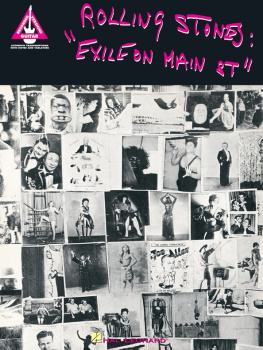VIKING
Published by the Penguin Group
Penguin Group (USA) LLC
375 Hudson Street
New York, New York 10014

USA | Canada | UK | Ireland | Australia | New Zealand | India | South Africa | China
penguin.com
A Penguin Random House Company
Published by Viking Penguin, a member of Penguin Group (USA) LLC, 2014
Copyright 2014 by Paul Trynka
Penguin supports copyright. Copyright fuels creativity, encourages diverse voices, promotes free speech, and creates a vibrant culture. Thank you for buying an authorized edition of this book and for complying with copyright laws by not reproducing, scanning, or distributing any part of it in any form without permission. You are supporting writers and allowing Penguin to continue to publish books for every reader.
First published in Great Britain as Sympathy for the Devil: The Birth of the Rolling Stones and the Death of Brian Jones by Bantam Press, an imprint of Transworld Publishers, A Random House Group Company.
Photograph credits appear .
ISBN: 9781101614723
Version_1
To Hubert Sumlin, Pops Staples and all their fellow, forever-young pioneers.
Contents
Prologue
I T WAS ONLY a raggle-taggle bunch of musicians, kids really, and the way history normally unfolds, there should have been no way any witnesses would have spotted that something world-changing was happening. Yet, the leader of the band did have something special about him the way he sneered at the audience, getting in their faces, coaxing out shimmering glissandos from his guitar in a style no one had ever seen before, or switching over to an amplified blues harp, still a radically new instrument for most of the teenagers who watched him and his companions intently. Elmo Lewis, as he called himself, introduced several of the numbers and ministered to the rest of his band lovingly, like a mother hen, checking that the singer Mick had got the beat, and keeping a close eye on his fellow guitarists fretboard. Occasionally, when the riffs cohered into something stirring and electrifying, he and the piano player the other more obviously experienced musician would look at each other and smile in satisfaction.
Truth is, though, that some people in that decent-sized crowd watching the Rolling Stones, crammed on to the Marquee stage, in July 1962 and some among those at other little clubs around London over the next few weeks did spot that something unique was happening. One girl felt the ground beneath her shifting as the band ripped through twenty songs, picked out and overseen by the blond guitarist. At her London grammar school, Cleo Sylvestre had been taught that the role of black people in culture was as heathens and savages. Now, as the band hot-wired this obscure music from deep within the black ghettos of the Chicago Southside and the Mississippi Delta, a new world opened up a world in which black people like her would have a voice, a role.
Some musicians spotted it, too. Ginger Baker, an aggressive young drummer who had cut his teeth in the trad jazz clubs and was being persuaded into the blues scene by the silver-tongued club owner Alexis Korner, was dismissive of the Stones upstart singer. Yet still he reckoned that the bands exuberant, snotty, teenage take on this deep, resonant music was something radical and new.
Businessmen got it. Harold Pendleton, manager of the Marquee and a mainstay of the jazz scene, was likewise unimpressed by the bands music yet still noted something powerful about their attitude a challenging of authority, a disregard for convention that emanated principally from Brian Jones, the twenty-one-year-old who styled himself Elmo Lewis. Jones was a visionary, Pendleton reckoned, although there was something he didnt like about him. He used the term evil genius.
As for Brian himself, the momentary satisfaction he felt as the band hed masterminded took to the stage was itself world-changing. The music was the one thing that gave meaning to a life that was fractured, restless and unhappy. Now, over fifty years on, that situation endures. Brian Jones got many things wrong in his life, but the most important thing he got right, for his music was world-changing.
History is written by the victors, and in recent years weve seen the proprietors of the modern Rolling Stones describe their genesis, their discovery of the blues, without even mentioning their founder. Weve seen Brian Jones described as a kind of rotting attachment. This phrase in itself gives an idea of the magnitude of this story. The dark power of the Stones music derives from their internal battles, a sequence of betrayals, back-biting, sexual oneupmanship, violence, madness and mania.
The aim of this book is not to gloss over the many flaws of Brian Jones, for if ever a man was driven by his flaws, it was he. His contrariness, his vulnerability and his unhappiness prompted his estrangement from the establishment, and ultimately would underpin the values of the band, which challenged that establishment so provocatively. There was a darkness in his heart that inspired his exploration of the Devils music, of the story of Robert Johnson, the man who traded the secrets of guitar playing for his immortal soul. Brian sought out those secrets, and was the first man to communicate them to a new generation. It was he who opened the doors to that new world, unlocking its secrets both for his bandmates and for us.
In the course of writing this book Ive travelled far, and plumbed deep. Its a sad story of messy lives, unwanted children, ruthlessness and misogyny, of feuds both petty and profound. But great art can come from messy situations. As we shall see, right from the start there was something of the Devil in Brian Jones. And as we know, the Devil has the best tunes.
Secrets and Lies
N EW WORLDS ARE often dreamed up in the most mundane locations. Few people would have imagined the genteel, manicured spa town of Cheltenham as a cradle for a radical new musical manifesto. But the place turns out to be funny that way, countless secrets having been harboured behind those deceptively staid facades. Brian Jones was in fact a typical Cheltonian. By the time he left the place hed discovered more musical secrets than were ever supposed to exist, as well as amassing more secret children, and heartbreak, than can ever have been imagined.
The word genteel seems to get applied to Cheltenham with monotonous regularity. And yes, perhaps it is an appropriate adjective, as long as you bundle in alongside it the following words: secretive, exotic, futuristic, sordid, elegant, decadent and artistic. Nearly all of those terms capture the early life of Lewis Brian Hopkins Jones, a boy whose destiny seemed more than any other dictated by his surroundings and upbringing. He was the son of an ambitious man who worked at the cutting edge of a world-changing technology. Lewis Blount Jones was, like the son who carried his name, a genius; yet his life was defined by secrets, repression and the traditional British stiff upper lip. This legacy would also define the life of Lewis Jones Jr, for better and for worse.
Any visitor whos new to the town would be instantly struck by the serene beauty of its gleaming white Regency buildings. A long, wide promenade runs south from the high street (location of Brians grammar school) down to a group of buildings around Lansdown Crescent and Montpellier Walk, all airy shops and coffee bars, framed by caryatids pillars in the shape of serene women, like those of the Acropolis. Over the road lie the fine green lawns of Imperial Gardens, with the Queens Hotel just in front; a little further down is the Pump Room, another jewel of Georgian architecture, based on the Pantheon; Regency terraces stretch in every direction, the very model of taste and discretion. But as Barry Miles, founder of counter-culture journal












